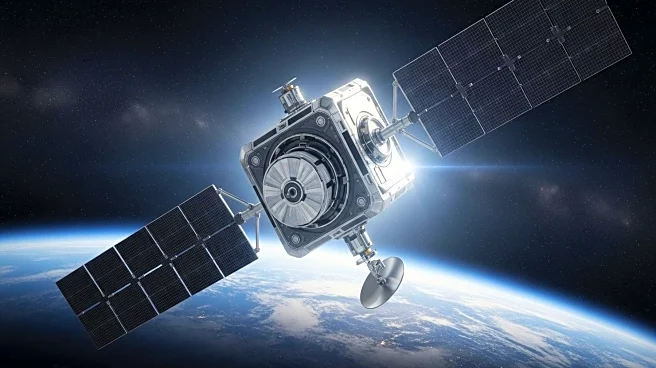What is the story about?
What's Happening?
The Federal Communications Commission (FCC) has concluded its investigations into EchoStar, a satellite operator, as the company moves forward with plans to sell spectrum to SpaceX and AT&T. These transactions, valued at over $40 billion, are pivotal in reshaping the direct-to-device (D2D) satellite communications landscape. EchoStar had been under scrutiny since May due to allegations from SpaceX and others that it failed to meet 5G network deployment conditions, leaving valuable frequencies unused. In response to regulatory pressure and the looming threat of bankruptcy, EchoStar decided to sell its spectrum assets, abandoning its ambitions to operate as a traditional mobile carrier and D2D constellation. SpaceX plans to utilize the acquired spectrum to enhance its D2D network, which currently relies on cellular airwaves from partners like T-Mobile. The company is investing $17 billion in cash and stock for these frequencies and will make approximately $2 billion in interest payments on EchoStar's debt through November 2027.
Why It's Important?
The resolution of EchoStar's regulatory issues and the subsequent spectrum sales to SpaceX and AT&T mark a significant shift in the satellite communications industry. SpaceX's acquisition of spectrum is expected to bolster its Starlink service, potentially offering a standalone cellular service bundled with its satellite broadband. This move could enhance indoor coverage where satellite signals are weak, benefiting consumers and expanding SpaceX's market reach. The increased spectrum capacity is anticipated to improve throughput, bringing SpaceX's service closer to the capabilities of terrestrial 5G networks. This development could intensify competition in the telecommunications sector, impacting pricing and service offerings. Additionally, EchoStar's decision to sell its spectrum assets reflects the challenges faced by satellite operators in meeting regulatory requirements and adapting to market demands.
What's Next?
EchoStar still requires FCC approval for the spectrum transactions, but indications suggest clearance is likely. SpaceX's plans to enhance its D2D network with the new spectrum could lead to further innovations in satellite communications. The company may explore partnerships with T-Mobile to improve indoor coverage, potentially launching new services that integrate satellite and terrestrial networks. As SpaceX expands its capabilities, other industry players may need to adapt their strategies to remain competitive. The telecommunications landscape could see shifts in service offerings, pricing models, and consumer adoption rates as satellite technology becomes more integrated with traditional cellular networks.
Beyond the Headlines
The sale of spectrum by EchoStar and its shift away from traditional mobile carrier ambitions highlight the evolving dynamics in the satellite industry. This transition underscores the challenges faced by satellite operators in balancing regulatory compliance with market viability. The integration of satellite and terrestrial networks could lead to new business models and partnerships, influencing the future of global communications. Ethical considerations regarding spectrum allocation and usage may arise as companies navigate regulatory landscapes and technological advancements.
















